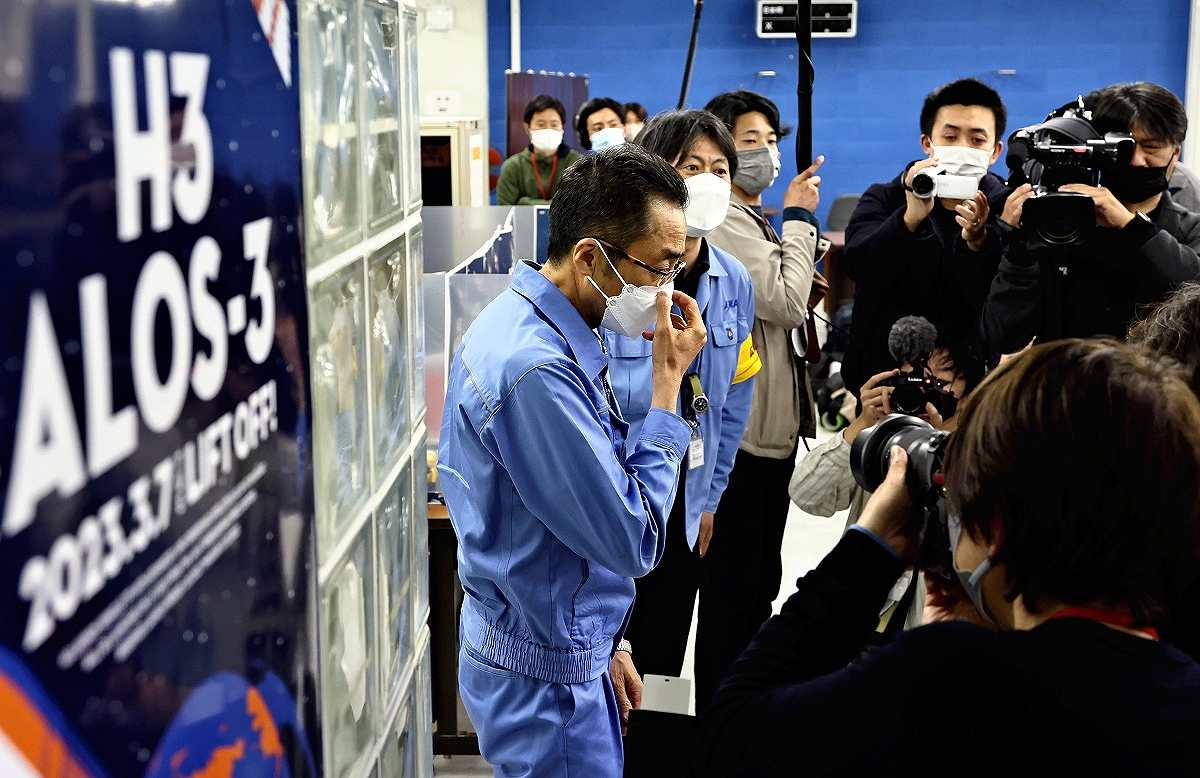
Masashi Okada, a project manager at JAXA, speaks to the media about the failed launch of the H3 rocket at the Tanegashima Space Center in Kagoshima Prefecture on Tuesday afternoon.
14:46 JST, March 8, 2023
The H3 rocket’s failed launch was the latest in a string of such failures among the launch vehicles of the Japan Aerospace Exploration Agency (JAXA). These setbacks are putting Japan’s rocket development program in a critical situation.
Expected to be the next flagship rocket of Japan’s space development with its lower cost and higher launch capacity than the current H-2A rocket, the H3 failed just minutes after liftoff Tuesday.
“We take this series of launch failures very seriously,” said JAXA President Hiroshi Yamakawa at a press conference later in the day. “It is our responsibility to investigate the cause of the failure, and our top priority issue is to quickly restore trust.”
The first H3 rocket was launched at 10:37 a.m. Tuesday from Tanegashima Space Center in Kagoshima Prefecture. About five minutes later, the LE-9 first-stage engine, which encountered difficulties during development, finished its combustion as planned. This was followed by the separation of the first stage from the second, which went smoothly.
After that, the second-stage engine was supposed to ignite to accelerate the rocket, but the engine did not do so, and the speed gradually decreased.
At 10:51 a.m., about 14 minutes after liftoff, JAXA transmitted a destruct command to the rocket to destroy its fuel tank, as the space agency concluded that it was no longer possible to put the satellite it was carrying into orbit. JAXA believes that the rocket, together with the satellite, fell into the ocean to the east of the Philippines.
Electrical system issue?
The H3’s second-stage engine was 12 meters long and 5.2 meters in diameter. It inherited most of the H-2A’s second-stage engine, which was supposed to ignite when it received a signal from an electronic device mounted in the body of the second-stage rocket.
“We will narrow down the cause, focusing on whether there were any problems with the exchange of electrical signals between the vehicle and the engine,” said Masashi Okada, a project manager at JAXA.
In the 46 previous H-2A launches, the second-stage engine had not been the cause of any trouble, he said.
To cut costs, 90% of the H3’s electronic components were adopted from inexpensive parts used for automobiles and inspections are being automated.
Regarding the connection between these efforts and the failed launch, Okada explained, “Automotive parts are highly reliable, and we have also conducted vibration tests and so forth for rockets.”
No plan yet to recover vehicle
To determine the cause of the failure, JAXA is urgently analyzing the flight data sent from the rocket. The rocket itself, however, is believed to have sunken deep into the sea, and JAXA has no plan to recover it at least for now.
When the launch of the eighth H2 rocket failed in November 1999, JAXA recovered the vehicle, which had sunken to the bottom of the ocean. The recovery helped confirm the rupture within the main engine, enabling JAXA to get close to identifying the cause of the failure.
“If it was an issue with the electrical system,” Okada said, “the analysis of flight data would be more helpful in narrowing down the cause.”
JAXA aims to uncover the cause of the problem as soon as possible, but it will not be easy to regain the rocket’s credibility.
The launch of the small solid-fuel rocket Epsilon-6 failed last October, with a destruct command issued as well. There is no prospect of launching the Epsilon’s successor.
After the launch of the sixth H-2A rocket failed in 2003, it took 15 months before the seventh rocket lifted off.
“The key to finding the cause of the failure lies in whether detailed data on the engine’s electrical system can be collected,” said Koichi Yonemoto, a professor at the Tokyo University of Science and a scholar on aerospace engineering. “It is necessary to proceed with verification steadily and without haste.”
Top Articles in Science & Nature
JN ACCESS RANKING
-

Japan Institute to Use Domestic Commercial Optical Lattice Clock to Set Japan Standard Time
-

Israeli Ambassador to Japan Speaks about Japan’s Role in the Reconstruction of Gaza
-

Man Infected with Measles May Have Come in Contact with Many People in Tokyo, Went to Store, Restaurant Around When Symptoms Emerged
-

Prudential Life Insurance Plans to Fully Compensate for Damages Caused by Fraudulent Actions Without Waiting for Third-Party Committee Review
-

Woman with Measles Visited Hospital in Tokyo Multiple Times Before Being Diagnosed with Disease


























